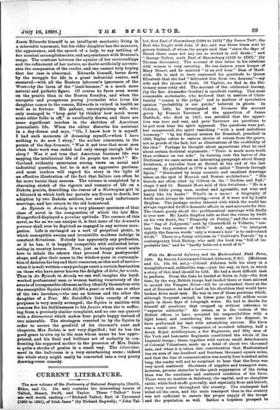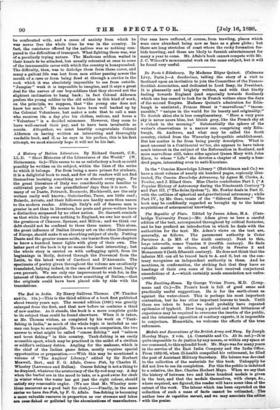With the Mounted Infantry and the Mashonaland Field Force, 1896.
By Brevet-Lieutenant-Colonel Alderson, P.S.C. (Methuen and Co. 10s. 6d. net.)—Colonel Alderson tells his story in a straightforward, soldierlike way,—just the way, in fact, in which a story of this kind should be told. He had a most difficult task to perform. From the time he landed at Beira in July—the first time, by the way, British troops had landed there or been allowed to ascend the Pungwe River—till he re•embarked there at the end of December, he had a load on his shoulders that would have broken down most men. He was in one of those positions which, although frequent enough in times gone by, will seldom occur again in these days of telegraph wires. He had to decide for himself all questions that cropped up without reference to "superior authority." He seems, as is the custom of the British officer, to have accepted his responsibilities with a light heart, and considering the means at his disposal, to have performed his task with astonishing success. His force was a small one. Two companies of mounted infantry, half a dozen Royal Artillerymen, a few Engineers, and fifty men of the York and Lancaster Regiment constituted the whole of the Imperial troops ; these, together with various small detachments of Colonial Volunteers, made up a total of about two thousand men, and when it is taken into consideration that Mashonaland has an area of one hundred and fourteen thousand square miles, and that the line of communication was nearly four hundred miles long, the reader will not be surprised to hear that the force was very much scattered. Shortness of supplies and transport were, however, greater obstacles to the quick suppression of the rising than was the smallness and scattered condition of his force. There were no mealies in Salisbury, the capital, and no slaughter cattle, while food-stuffs generally, and especially flour and biscuit, were very scarce throughout the country. The rinderpest had killed all the oxen, and the mule transport then in the country was not sufficient to ensure the proper supply of the troops and the population as well Rather a hopeless prospect to be confronted with, and a cause of anxiety from which be was never free the whole time he was in the country. In fact, the resistance offered by the natives was as nothing com- pared to the difficulties of transport. What fighting there was, was of a peculiarly trying nature. The Maahonas seldom waited in their kraals to be attacked, but usually retreated at once to some of the innumerable caves with which the country is honeycombed. The difficulty, then, was to dislodge them from these caves, and many a gallant life was lost from men either passing across the month of a cave or from being fired at through a crevice in the rock which it was absolutely impossible to see from outside. "Jumpier" work it is impossible to imagine, and it says a great deal for the nerves of our boy-soldiers that they showed not the slightest inclination to hang back ; in fact Colonel Alderson prefers the young soldier to the old soldier in this kind of work, on the principle, we suppose, that " the young one does not know too much." He seems to have been well backed up by the Colonial Volunteers, but makes a note that to call a man who receives 10s. a day plus his clothes, rations, and horse a " Volunteer" is a decided misnomer. However, they seem to have well-earned their pay, and to have been invaluable as scouts. Altogether, we must heartily congratulate Colonel Alderson on having written an interesting and thoroughly readable book, and if, as he says in his preface, this is his first attempt, we most sincerely hope it will not be his last.



































 Previous page
Previous page